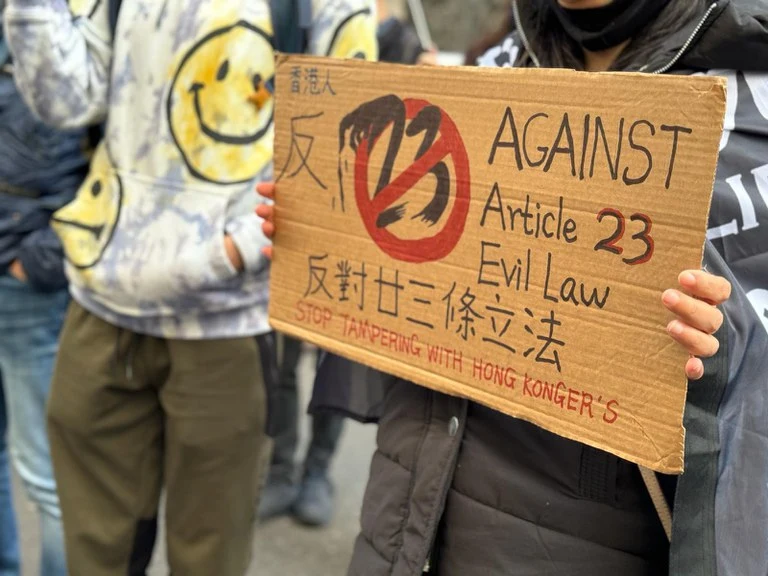The individuals received sentences ranging from 10 to 14 months for displaying political slogans.
On September 19, 2024, Hong Kong saw the first individuals sentenced under its newly enacted security law, known as Article 23, which has been in force since March 23, 2024.
Chu Kai-pong received a sentence of one year and two months after pleading guilty to a charge of “committing acts with seditious intent” under the Safeguarding National Security Ordinance, more commonly referred to as Article 23. Just hours later, Chung Man-kit was sentenced to 10 months in prison after pleading guilty to three similar charges.
On September 20, Au Kin-wai became the third person sentenced under this law, receiving a prison term of one year and two months after admitting guilt to “knowingly publishing publications with seditious intent.”
With these sentences, Chu, Chung, and Au became the first individuals jailed under the controversial Article 23. However, they are not alone in facing charges related to this law. Hong Kong Free Press (HKFP) has examined the six months since its implementation, revealing a pattern of arrests related to the new legislation.
What is Article 23?
Article 23, the Safeguarding National Security Ordinance, targets a wide range of offences including treason, insurrection, sabotage, sedition, espionage, and theft of state secrets. It allows for pre-charge detention for up to 16 days and limits suspects’ access to legal representation. The penalties can be severe, including life imprisonment for certain offences.
After being shelved in 2003 due to mass protests, Article 23 was fast-tracked and unanimously approved by Hong Kong’s legislature in 2024, which no longer has any formal opposition. The law has since faced widespread criticism from international rights groups, Western governments, and the United Nations, with detractors labelling it vague, overly broad, and regressive. Nonetheless, the Hong Kong government justified its enactment by citing the need to close “security loopholes” following the pro-democracy protests of 2019.
How Many Have Been Arrested Under Article 23?
Since its enactment, at least 14 individuals have been arrested under suspicion of violating Article 23, according to HKFP’s records. All the arrests so far have involved charges related to sedition.
The first wave of arrests occurred on May 28, 2024, when six people, including rights activist Chow Hang-tung, were taken into custody for allegedly committing offences involving seditious intentions. Secretary for Security Chris Tang stated that the arrests were linked to posts on a Facebook group that supported Chow, who has been in detention under a separate national security law since September 2021. The posts reportedly used a “sensitive upcoming date” to incite hatred against the Hong Kong and central governments, as well as the judiciary. Following these arrests, two more individuals were detained in connection with the same Facebook group, also for sedition-related offences.
Though Chow remains in custody, the other seven were released on police bail without formal charges.
The timing of these arrests was significant, occurring just one week before the 35th anniversary of the Tiananmen Square crackdown, during which hundreds, possibly thousands, of student protesters were killed by China’s People’s Liberation Army on June 4, 1989. The Hong Kong Alliance in Support of Patriotic Democratic Movements of China, of which Chow was vice-chair, had previously organized annual vigils to commemorate the victims, but the events have been banned since 2020 due to both Covid-19 restrictions and increasing government pressure.
On June 4, 2024, a 68-year-old woman became the ninth person arrested under Article 23 for chanting slogans in Causeway Bay near the vigil site. She was released the following day without being charged.
On June 12, marking the fifth anniversary of clashes between protesters and police during the 2019 unrest, Chu Kai-pong was arrested again, this time for wearing a T-shirt bearing the slogan “Liberate Hong Kong, revolution of our times.” The phrase had previously been ruled by the court as carrying secessionist connotations during the first trial under a separate national security law imposed by Beijing in 2020.
Another notable arrest under Article 23 occurred on June 21, when Au Kin-wai was charged with “knowingly publishing publications with seditious intent.” This was related to a series of social media posts that featured the slogan “Revolution is no crime, to rebel is justified,” a phrase that dates back to China’s Cultural Revolution.
Chung Man-kit’s arrest followed on June 23 for scrawling graffiti on bus seats, including the slogan “Liberate Hong Kong, revolution of our times” alongside other messages advocating for Hong Kong’s independence.
The final two arrests came on August 30, involving a man and woman linked to the suicide of a City University professor. The individuals were accused of sedition for sharing a purported suicide note connecting the death to political developments in Hong Kong since 2019. Both were released on police bail without charges.
As of September 2024, 14 arrests have been made under Article 23, although the Security Bureau has not yet released official figures.
How Many Have Been Charged Under Article 23?
According to HKFP, three individuals have been formally charged under the new law: Chu Kai-pong, Chung Man-kit, and Au Kin-wai. All three pled guilty and were sentenced to prison terms ranging from 10 to 14 months.
Article 23 also raises the threshold for early release, with those imprisoned for national security offences unable to reduce their sentences for good behaviour as easily as other inmates.
After sentencing Chu and Chung on September 19, Chief Magistrate Victor So stated that their convictions demonstrated that “any person intending to endanger national security or incite social hatred can never escape the sanctions of the law.” A government statement reiterated the importance of maintaining the rule of law and warned that failure to act in time could lead to renewed chaos in society.
However, rights groups such as Amnesty International and the Human Rights Foundation condemned the sentences, calling them a blatant violation of freedom of expression and urging the Hong Kong government to drop the charges and release those imprisoned under the new law.
